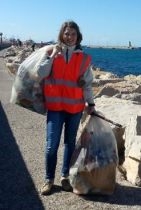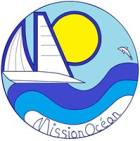Mission Ocean: What Goes Around, Comes Around

The amount of trash in the ocean is increasing every moment. We’ve all seen the infographics about how long a soda can or a cigarette butt will take to disappear, but the truth of the matter is that anything containing plastic – the labels off your beer bottle, your bag of chips, your tampon applicator or disposal razors – never really disappears.
Once that plastic gets into the sea, it gets broken down by exposure to UVs and the pounding it gets from the ocean, but those little bits just keep getting smaller and smaller. They become so tiny they can be ingested by fish, or even plankton, and enter the food chain… Would you drink a glass of petrol? I didn’t think so. And yet plastic is just a byproduct of petrol production, and it’s ultimately ending up on our plates and in our bellies.
We recently watched a French documentary where samples of mussels were taken from across France and Spain. The mussels were dissolved, and microplastics filtered out and measured. The results were horrendous – for 100g of mussels up to a staggering 57 pieces of microplastic were found… That’s a lot of plastic for one bowl of moules frites.

And it’s only getting worse. These comments from seasoned sailors on the Women Who Sail Facebook page speak for themselves:
“Just made our first Bahamas trip and I was overwhelmed by the amount of trash everywhere, on the beaches and in the towns...”
“I sailed offshore in the 1980's (with my two children ages 4 and 10 - by sextant!) when the oceans and beaches were so pristine. The magnitude of change/demise in these 30 years is horrific.”
Without specialist equipment, filters and nets, there isn’t much we can do about the plastic that is already in the ocean. But we can do our best to avoid the trash ending up there in the first place. And a fantastic way to do that is through beach cleans.
We got into beach cleaning last summer when we took part in one in Cannes. We were blown away when we saw just how much trash was hiding in the sand, between the rocks and along our shores. Since then, we have organized a dozen beach cleans, with over 500 participants getting involved, and hundreds of kilos of rubbish picked up, properly disposed of and recycled where possible.

The towns local to us in the South of France have generally been incredibly enthusiastic about getting involved – a bit of a surprise, perhaps, as it could be considered bad press showing just how much the municipal services just don’t catch during their cleaning of public beaches. The towns of Cannes and Villeneuve-Loubet have been particularly supportive, providing us with equipment, gloves, hi-vis vests and – most importantly – joining us on the day to help clean up the beaches.
Local supermarkets have even got involved (we work with Satoriz, a chain of French organic supermarkets) to provide us with plastic-free drinks and snacks for our volunteers.
Mission Ocean recently launched the #BeachCleanChallenge on Facebook, and we are incredibly proud to say that we helped events to take place along coastlines in Spain, Algeria, Mexico, and across France as a result. Others are already planned in the UK and New Zealand, and we will happily help organize others elsewhere.

Beach cleans don’t have to be such a big, organized affair. Taking a walk along the beach with a couple of friends, a bag and a pair of gloves can already make a massive difference. Or taking a bag with you when you go for a jog along the shore gets you doing lunges as you pick stuff up!
There are several different charities that have grown up around this kind of spontaneous, quick clean-up; check out Take3fortheSea, or 2MinuteBeachClean on Facebook and Instagram for some inspiration.
And if you are motivated to organize a big day, large local organizations may be able to help you with things like insurance, publicity and even safety guidelines. One great example of this is Surfrider; we have used them many times, and all they ask in return is a report of the sorts of trash that you find. We’ve met some fantastic people through the beach cleans that we’ve organized.

The short of it is that, however you decide to go about it, every piece of trash that gets picked up is one more that won’t get broken down into microplastics, pollute the beautiful oceans that we all work on and depend upon, or end up being ingested by some poor creature who cannot tell the difference.


Post your comment
You cannot post comments until you have logged in.
Login to post a commentComments
No one has commented on this page yet.
RSS feed for comments on this page | RSS feed for all comments